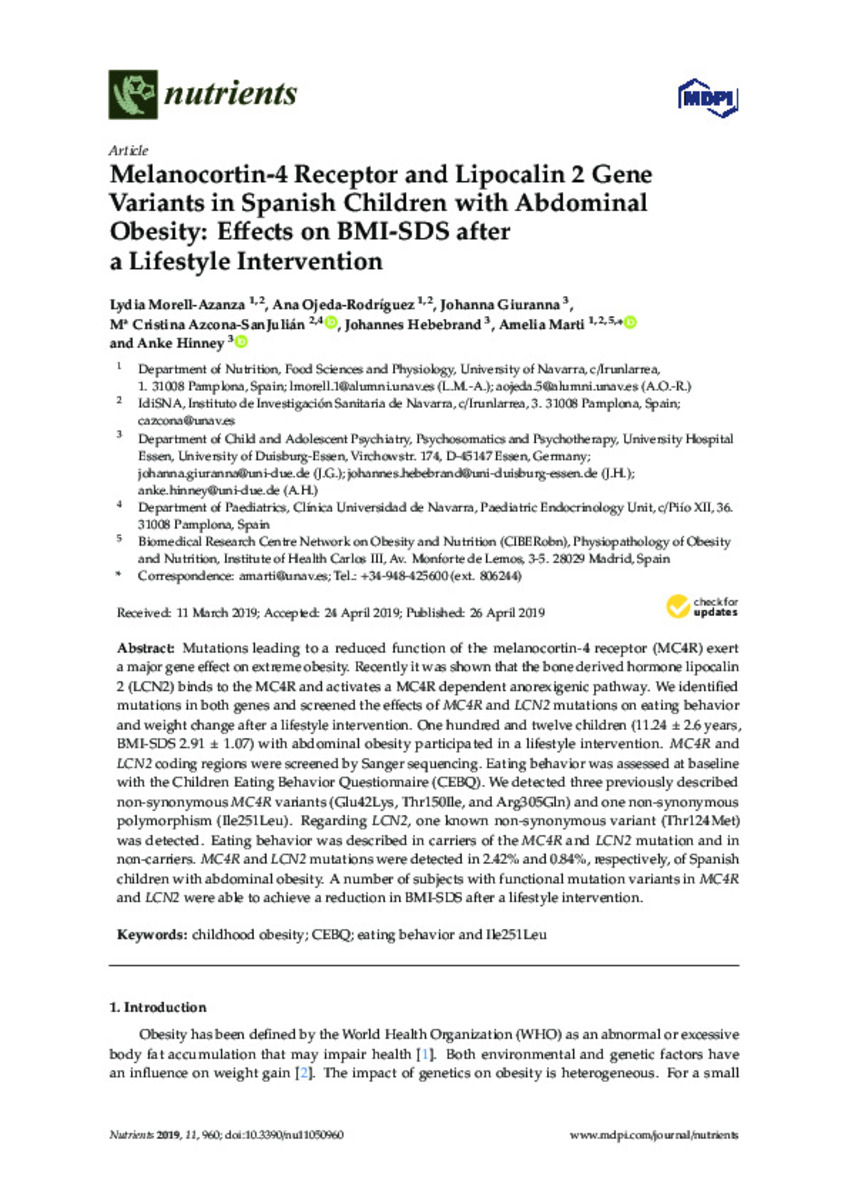Full metadata record
| DC Field | Value | Language |
|---|---|---|
| dc.creator | Morell-Azanza, L. (Lydia) | - |
| dc.creator | Ojeda-Rodríguez, A. (Ana) | - |
| dc.creator | Giuranna, J. (Johanna) | - |
| dc.creator | Azcona-San-Julian, M.C. (María Cristina) | - |
| dc.creator | Hebebrand, J. (Joahnnes) | - |
| dc.creator | Marti-del-Moral, A. (Amelia) | - |
| dc.creator | Hinney, A. (Anke) | - |
| dc.date.accessioned | 2021-09-24T07:31:39Z | - |
| dc.date.available | 2021-09-24T07:31:39Z | - |
| dc.date.issued | 2019 | - |
| dc.identifier.citation | Morell-Azanza, L. (Lydia); Ojeda-Rodríguez, A. (Ana); Giuranna, J. (Johanna); et al. "Melanocortin-4 Receptor and Lipocalin 2 Gene Variants in Spanish Children with Abdominal Obesity: Effects on BMI-SDS after a Lifestyle Intervention". Nutrients. 11 (960), 2019, 1 - 12 | es_ES |
| dc.identifier.issn | 2072-6643 | - |
| dc.identifier.other | PMID: 31035493 | - |
| dc.identifier.uri | https://hdl.handle.net/10171/62064 | - |
| dc.description.abstract | Mutations leading to a reduced function of the melanocortin-4 receptor (MC4R) exert a major gene effect on extreme obesity. Recently it was shown that the bone derived hormone lipocalin 2 (LCN2) binds to the MC4R and activates a MC4R dependent anorexigenic pathway. We identified mutations in both genes and screened the effects of MC4R and LCN2 mutations on eating behavior and weight change after a lifestyle intervention. One hundred and twelve children (11.24 ± 2.6 years, BMI-SDS 2.91 ± 1.07) with abdominal obesity participated in a lifestyle intervention. MC4R and LCN2 coding regions were screened by Sanger sequencing. Eating behavior was assessed at baseline with the Children Eating Behavior Questionnaire (CEBQ). We detected three previously described non-synonymous MC4R variants (Glu42Lys, Thr150Ile, and Arg305Gln) and one non-synonymous polymorphism (Ile251Leu). Regarding LCN2, one known non-synonymous variant (Thr124Met) was detected. Eating behavior was described in carriers of the MC4R and LCN2 mutation and in non-carriers. MC4R and LCN2 mutations were detected in 2.42% and 0.84%, respectively, of Spanish children with abdominal obesity. A number of subjects with functional mutation variants in MC4R and LCN2 were able to achieve a reduction in BMI-SDS after a lifestyle intervention. | es_ES |
| dc.description.sponsorship | The IGENOI study was supported by a MERCK foundation grant and Laboratories ORDESA (Sant Boi de Llobregat; Barcelona, España)-FEI-AEP grant. A.H. and J.H. were supported by the Deutsche Forschungsgemeinschaft (DFG; HI 865/2-1) and the BMBF (01GS0820). A.H. and J.G. were supported by the ‘Landesprogramm für Geschlechtergerechte Hochschulen-Programmstrang Förderung von Denominationen in der Genderforschung. | es_ES |
| dc.language.iso | eng | es_ES |
| dc.publisher | MDPI AG | es_ES |
| dc.rights | info:eu-repo/semantics/openAccess | es_ES |
| dc.subject | Materias Investigacion::Ciencias de la Salud::Medicina preventiva | es_ES |
| dc.subject | Childhood obesity | es_ES |
| dc.subject | CEBQ | es_ES |
| dc.subject | Eating behavior | es_ES |
| dc.subject | Ile251Leu | es_ES |
| dc.title | Melanocortin-4 Receptor and Lipocalin 2 Gene Variants in Spanish Children with Abdominal Obesity: Effects on BMI-SDS after a Lifestyle Intervention | es_ES |
| dc.type | info:eu-repo/semantics/article | es_ES |
| dc.description.note | This article is an open access article distributed under the terms and conditions of the Creative Commons Attribution (CC BY) license (http://creativecommons.org/licenses/by/4.0/). | es_ES |
| dc.identifier.doi | 10.3390/nu11050960 | - |
| dadun.citation.endingPage | 12 | es_ES |
| dadun.citation.number | 960 | es_ES |
| dadun.citation.publicationName | Nutrients | es_ES |
| dadun.citation.startingPage | 1 | es_ES |
| dadun.citation.volume | 11 | es_ES |
Files in This Item:
Statistics and impact
Items in Dadun are protected by copyright, with all rights reserved, unless otherwise indicated.






